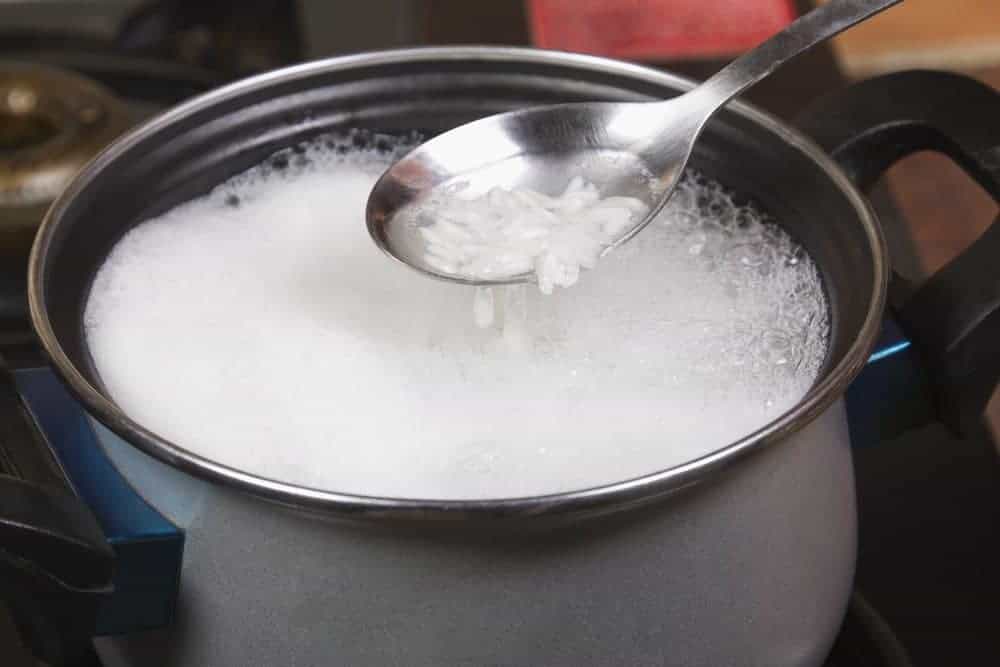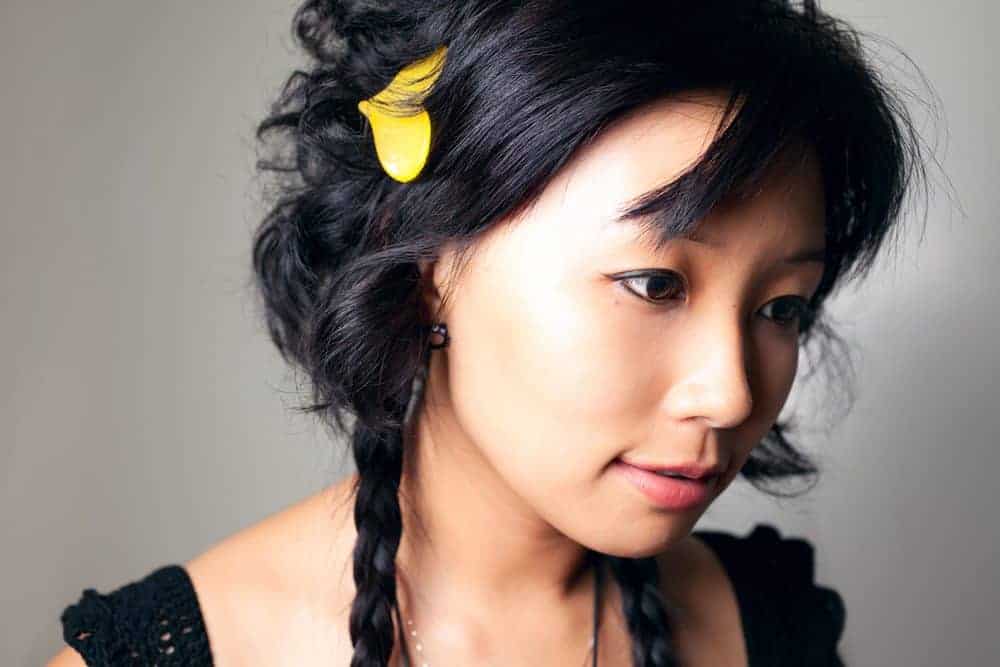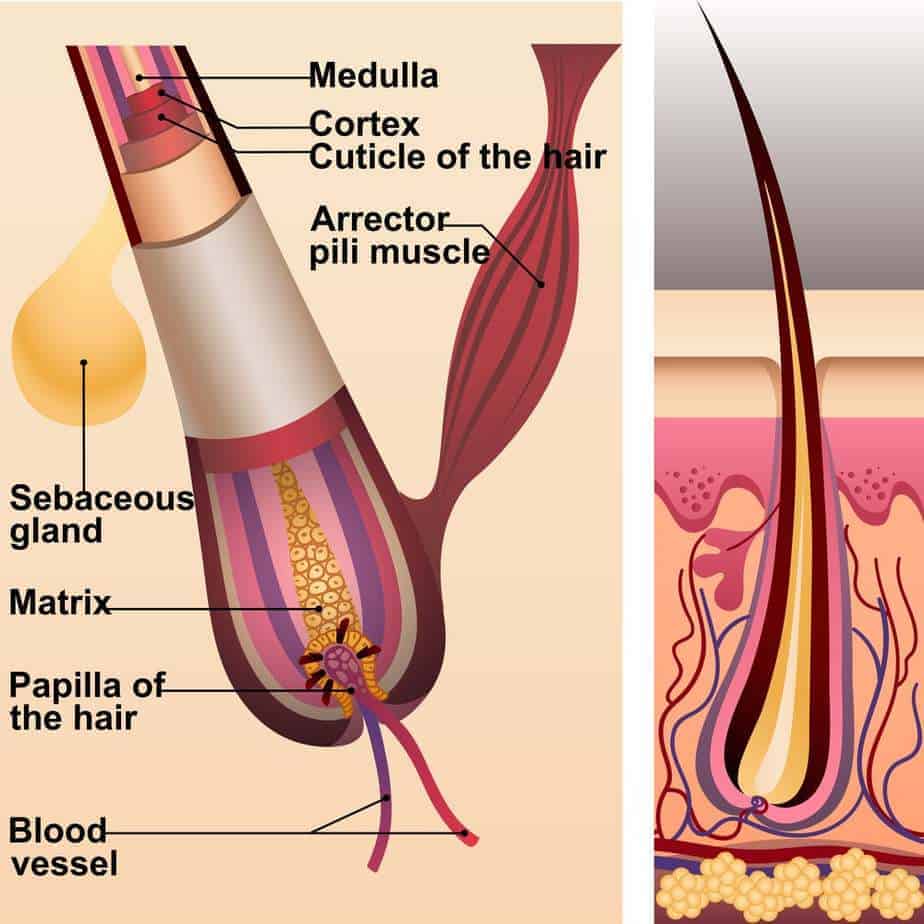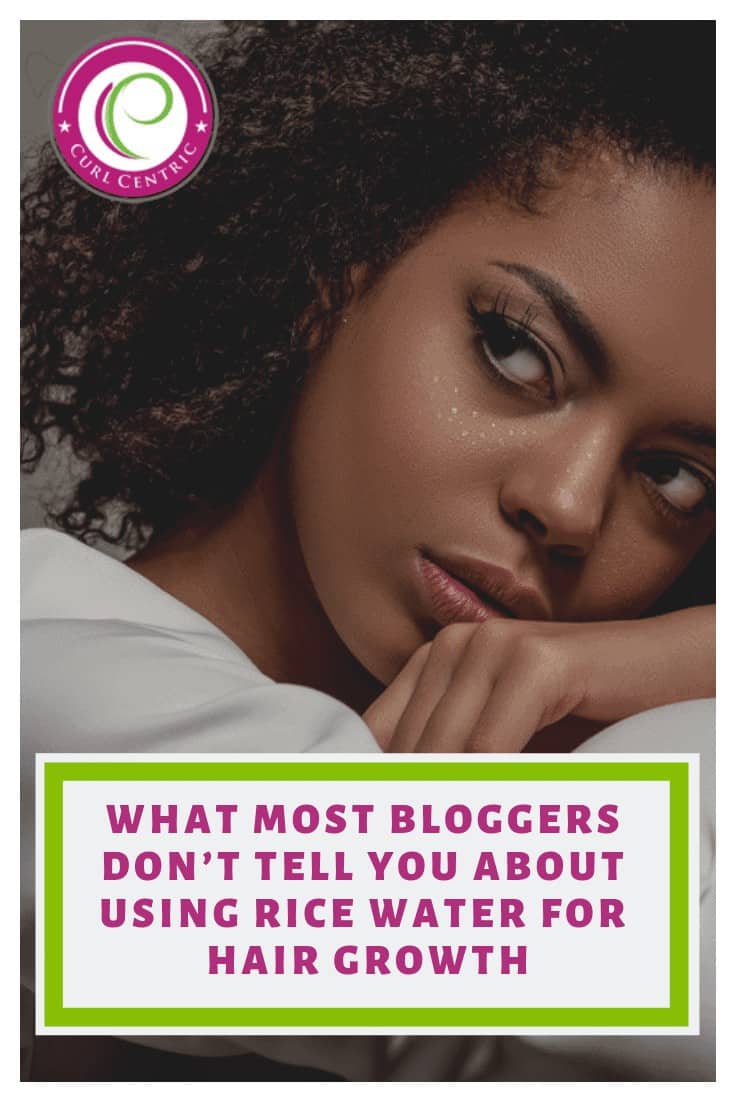
Lately, we've been asked if there are benefits to using rice water for hair and skin care. We've seen several before and after photos, which are often misleading.
Can rice water rinses prevent hair breakage?
Does rice water help your hair grow?
What are the benefits of using rice water for natural hair?
Table of Contents
- 1 How to Use Rice Water on Hair
- 2 Key Takeaways
- 3 What Is Rice Water?
- 4 Brief History of Using Rice Water for Hair Growth
- 5 Why Does Rice Water Work?
- 6 How To Make Rice Water for Hair Care
- 7 Rice Water Recipes for Hair Growth: How to Cook Rice Water for Hair
- 8 How Do You Use Rice Water to Promote Hair Growth?
- 9 The Benefits of Using Rice Water on Your Hair
- 10 The Side Effects of Using Rice Water
- 11 Frequently Asked Questions
- 11.1 How Do I Know If My Hair Will Benefit From Using Rice Water?
- 11.2 Do You Apply Rice Water to Wet or Dry Hair?
- 11.3 Can I Leave Rice Water in My Hair Overnight?
- 11.4 How Long Does It Take for Rice Water to Grow Your Hair?
- 11.5 Is Rice Water Good for Hair Regrowth?
- 11.6 How Long Should I Leave Rice Water in My Hair?
- 11.7 How Should I Use Rice Water for Hair Growth?
- 11.8 Are There Any Side Effects to Using Rice Water for Hair?
- 11.9 How Fast Can You See Results with Rice Water for Hair Growth?
- 11.10 How Often Should Rice Water Be Used for Hair?
- 11.11 How Much Water Do You Put In Rice Water?
- 11.12 What Culture Uses Rice Water for Hair?
- 11.13 What Herbs Can You Add Into Rice Water for Your Hair?
- 11.14 What Is the Best Rice To Use For Hair Growth?
- 11.15 How Long Should You Ferment Rice Water for Hair?
- 11.16 What About the Scalp?
- 11.17 How To Store Rice Water for Hair
- 11.18 Other Potential Uses
- 11.19 Related Articles
How to Use Rice Water on Hair
The best way to use rice water is to apply it on wet hair after shampooing and before conditioning. Ensure your hair and scalp are thoroughly saturated with water. Then, massage the rice water into your roots for optimal absorption.
Rice water is packed with beneficial nutrients like inositol and amino acids. However, it doesn't replace hair conditioner. Due to its high starch content, always follow up with a moisturizing conditioner. A moisturizing conditioner will help you prevent dryness.
If you want a more thorough treatment, try using rice water as a mask before shampooing. Just apply it to damp hair for 20 minutes, then rinse and continue with your usual shampoo routine.
Key Takeaways
- Rice Water Benefits: Rice water has inositol, vitamin E, and vitamin B, which makes your hair shiny and promotes growth. The starchy liquid has been used for centuries, offering numerous hair care benefits.
- Making Your Own Rice Water: Using fermented rice water is recommended to maximize its benefits. To prepare, let the water stand at room temperature after rinsing the rice. Consider enhancing the rice water mixture with aloe vera for added benefits.
- Application Tips: To get the best results, use rice water on wet hair. Don't keep it on for over 20 minutes to avoid protein overload. Avoid using it on dry hair since the starch can cause brittleness.
- Potential Side Effects: Many ladies report reduced hair loss, while others warn of potential protein overload. Side effects can be magnified in low-porosity hair. This can lead to dryness, breakage, and buildup.
Keep reading to learn more about rice water benefits and how this age-old remedy can revolutionize your hair care routine.
What Is Rice Water?
In short, rice water is the starchy water obtained by draining boiled rice.
To make your rice water, we recommend cooking rice in a pot of boiling water according to the cooking instructions on the package. The starch from the rice is released into the water, creating hair milk made from rice water.
Remove the rice, and you’re done. This process creates what some people call “rice water hair milk.” So, rice water is made from rice, obviously. It’s water that has either cooked or soaked rice grains and has absorbed many of its best qualities.
Primarily, rice water contains rice starch.
Rice naturally contains starches. In fact, its starch content is very high at around 70% to 80%. When it is heated, boiled, or even rinsed, those starches are released into the water.
The water that remains is the rice water. It will have a whiteish color (depending on the color of the rice itself) and a somewhat grainy or milky texture.

Brief History of Using Rice Water for Hair Growth
There is a town in China called the Huangluo Yao Village, where the Red Yao tribe currently lives. The village is commonly referred to as the “Land of Rapunzels” because many of the women who live in the Huangluo Yao Village are known for having long, beautiful hair.
The Guinness Book of World Records even referenced this long-haired village.
So, what is their secret?
The women who live in the village wash their hair with rice water.
Hundreds of years ago, women from Japan were known for their beautiful long hair, too. The exciting thing about it is that they had something in common with the women of the Red Yao tribe; they were also using rice water to wash their hair.
While it occurred centuries ago, it is a tradition that has since been passed on to different generations.
As time has passed and technology has advanced, more people from around the world have been able to research and learn about the hair care practices of different cultures, including the use of rice water.
Let’s face it: ancient people were often more resourceful than we were then. Just as they used all parts of the animals that they hunted or raised, they also tried to use all parts of the plants that they grew.
In addition, they didn’t have running water (at least not how we do now). Therefore, water, which often had to be gathered and carried from wells or other sources, was not wasted.
After cooking rice, the leftover water was probably used for bathing or washing out of necessity, and that’s quite possibly how the tremendous benefits were discovered.
It is unclear whether this knowledge was passed on from one culture to another or was discovered separately by different cultures around the same time. More than likely, it’s a little bit of both.
There is solid documentation of its use in Japan during the Heian Period (the 8th-12th centuries CE). They called hair treated with rice water Suberakashi and credited it to Yu-Su-Ru (the water leftover from rinsing and cooking rice).
There is also surviving artwork of women with thick, floor-length hair.
In addition, to this day, Yao women in Huangluo, China, use rice water to grow incredibly long hair and prevent greying. They are often called “real-life Rapunzels” since their hair is so long.
Very likely, women in many Asian cultures continued to use rice water down to the present day.
It is only recently, though, that women in the West have caught on to this ancient beauty secret, lending credence to the belief that all of the best remedies are found in nature.
Why Does Rice Water Work?
The Internet is full of anecdotal evidence for the efficacy of rice water, but there is science behind it as well. Rice itself is full of essential vitamins and minerals, which are then transferred to the water when rice water is made.
These include vitamins B and C, which are terrific for hair. It also contains amino acids and antioxidants, which can help detox your hair.
In 2010, the International Journal of Cosmetic Science published an article about the benefits of using rice water in human hair. They concluded that rice water had two main benefits: increasing the hair's elasticity and reducing surface friction.
Hair elasticity refers to how much a strand of hair can stretch before it breaks. The greater hair elasticity you have, the less breakage you will have in your hair.
It is especially great for women who like to style their hair in different ways since the styling process often entails a lot of pulling and stretching of the hair strands.
Reducing surface friction is also important for healthy hair. Friction is simply a word to describe one thing rubbing against another.
Surface hair friction mainly refers to hairs rubbing against each other (though hair friction also occurs when you comb, curl, straighten, dry, or style hair). More rubbing, or more friction, results in more hair damage.
Therefore, by increasing airflow between your hair strands and reducing surface friction, a rice water treatment can help keep your hair healthy.
In addition, there is ample evidence that rice water is good for your scalp, especially if your scalp is dry, as it acts as a natural conditioner (as long as you don’t use too much).
It can soothe your scalp (and skin) irritation as well, which can sometimes be the cause of dryness or even dandruff.
Finally, rice water can also make your hair shiny. The shiny factor is mostly based on anecdotal evidence since shininess is difficult to measure in a scientific manner.
Nonetheless, many rice water users report this pleasant side effect. So, we consider it one of many beauty benefits of using a rice water hair treatment.
How To Make Rice Water for Hair Care
There are a few different ways to make rice water, and we’ve included some good recipes in the next section. But let’s look at some basics here.
In order to make rice water, you need to extract the rice starches from the rice grains. Since you’re just extracting the starches, it doesn’t really matter what kind of rice you use.
If you eat rice regularly, use the water from rinsing and cooking the rice. If not, you can buy inexpensive rice at any food store.
Making rice water is about as simple as making rice itself, though it is not the same exact process since when you cook rice, the grains absorb almost all of the water in the pot. Let’s look at a few recipes.
Rice Water Recipes for Hair Growth: How to Cook Rice Water for Hair
First, assemble your equipment and ingredients. You will need a saucepan, bowl, or pot (depending on what method you use), strainer, measuring cup, spray bottle, or something to put the finished rice water in, rice, and water. Easy enough!
Some recipes recommend rinsing the rice briefly in a fine-mesh sieve before preparing the rice water (so you would let this water wash down the drain).
While you will lose some starch, it will also wash away any impurities, which is a good thing.
However, it isn’t absolutely necessary.
After rinsing, there are three main techniques that you can use. The first is soaking, which is the simplest.
Soaking Method
- Put uncooked rice in a bowl and add about four times the amount of warm water (a good baseline is a half-cup of rice and two cups of water).
- Let it sit for about 30 minutes until the water becomes cloudy and opaque.
- Strain the contents of the bowl through a sieve, capturing the water in another container.
- Add to a spray bottle, and the rice water is ready to use with your hair care routine.
With the soaking method, you will probably not need to dilute the rice water any further.
Boiling Method
A lot of people prefer the boiling method because heat aids in starch extraction. However, the rice water may come out grainier.
The other benefit of the boiling method is that the rice is also ready to be eaten after the water is strained.
- Add a half-cup of uncooked rice and two cups of water to a saucepan or pot.
- Bring to a boil over medium-high heat.
- Reduce the heat, but allow the rice to boil for approximately 15 minutes.
- Keep an eye on it to make sure that the water isn’t evaporating too quickly. If it is, turn down the heat more or cover the pot.
- Strain the rice and reserve the water.
- Eat the rice in your favorite rice dish.
Fermentation Method (Creating Fermented Rice Water)
The last method for making rice water at home is the fermentation method. A lot of people, including celebrities, swear by fermentation.
This is because the process lowers the pH level of the water, which aids in the absorption of vitamins and minerals and can be less irritating to the skin.
- Use a half-cup to one cup of rice and soak in two cups of water for 20 minutes.
- Stir rice every five minutes.
- Strain the water through a sieve (you’ll notice that this is very similar to the first few steps of the soaking method).
- Let the water sit in a glass bottle overnight or for a couple of days if needed. It should still be murky but also have a sour smell.
- Once your rice water smells sour, transfer it to the refrigerator. It is fermented and ready to go.
Rice Water Shampoo
Bonus: You can make shampoo from your rice water, so we thought that we’d add those instructions in the recipe section as well.
- Make rice water with one of the first two methods above.
- Add all-natural soap nuts to the strained rice water.
- The soap nuts should dissolve and turn the mixture soapy. You can add more water if needed.
- We recommend making it a little at a time and storing it in the refrigerator to prolong its useful life.
Always store rice water in the refrigerator and shake it up before using it.
How Do You Use Rice Water to Promote Hair Growth?
There are a few different ways to use rice water for hair health. Typically, the treatment is best used on wet, clean hair.
One important step to note: always shake your rice water before using it!
The elements within the treatment can separate while it sits, but shaking it will recombine them.
- Make your own shampoo or conditioner with rice water (see recipe above). This is a great option for ladies with dry scalps since it dilutes the rice water and avoids direct application. Keep in mind, though, that rice water is perishable, so just make a little bit at a time.
- Use rice water as a hair and scalp spray treatment after shampooing. After shampooing and conditioning your hair, spray rice water onto the hair and scalp generously. Massage it in if you want extra absorption. You can cover your head with a shower cap to prevent drying. Leave it on your hair for about 20 to 30 minutes, and then rinse thoroughly.
- Use it in the shower as a rinse. You can also shampoo your hair and then rinse it with rice water. This is best for oily hair or if you wash your hair almost every day. Let it stay on your hair for a few minutes, rinse thoroughly with regular water, and use a conditioner once the rice water is rinsed out if needed.
You’ll get the benefits of using rice water no matter which way you go, so feel free to try all three to see what works for you. You can also find your own method or use a combination of these. Just be sure to rinse the rice water out after each application.
The Benefits of Using Rice Water on Your Hair
So, are there benefits to using rice water for hair growth and breakage, as a hair spray, or as a hair rinse?
In addition to the latest scientific evidence, there is a fair amount of anecdotal evidence claiming numerous benefits to using rice water, including before and after photos.
Most beauty bloggers writing about this topic reference an article from the International Journal of Cosmetic Science. Although, I’m not sure that the article can be reliably used as a standalone source.
The article references hair care techniques from the Heian period. In Japanese history, the Heian period occurred during the years 794-1185.
Due to the age of the study, it’s unlikely that the study used modern scientific controls focused on an independent variable.
Consequently, this study is most likely an anecdotal report rather than an experiment conducted in a controlled test environment.

This particular article studied the effect of a hair rinse obtained from boiling rice and using rice water as a hair treatment.
The goal was to explore the history of hairstyles and hair care practices used by women in Japan.
For example, during the Heian time, many women combed their hair each day using Yu-Su-Ru (i.e., rice water). The thought was that rice water would reduce hair breakage and increase elasticity.
So, does rice water increase elasticity and reduce friction when you're combing your hair?
The article from the International Journal of Cosmetic Science would lead you to believe that rice water can do these things.
Although the article doesn’t mention that scientists conducted controlled experiments, it merely refers to the practices of Japanese people from the Heian period.
So it’s likely that they’ve found some form of evidence, like the written text from the Heian period.
Since the scientific evidence around using rice water is still developing, the practice of using rice water to stimulate hair growth and other beauty practices is primarily supported by anecdotal evidence. Simply put, it’s a cultural practice supported by word-of-mouth.
For example, you will find several women who claim castor oil encourages hair growth or regrowth of thinning hair edges.
The problem is there is no scientific evidence supporting this castor oil claim, so we can only use anecdotal evidence.
It’s also worth mentioning that rice water rinses aren’t an exclusive solution limited to those on the continent of Asia, even though the techniques originated and were heavily used during the Heian period.
From the studies we have seen, all hair types are basically the same structurally, including African, European, and Asian hair types.
However, there are differences between hair types. Some hair types are straight, wavy, curly, or kinky. In general, all hair types have a common structure, with the cortex surrounded by a cuticle layer.

The Side Effects of Using Rice Water
Scientific studies on the use of rice water have revealed few detrimental effects, and the anecdotal evidence bears this out, too.
One of the only drawbacks is dryness, which is more likely if you already have dry hair or scalp. On the flip side, though, appropriate use of rice water can help restore a healthy balance to your scalp, which can eventually reduce dryness.
The 2010 study cited above notes that one of the less pleasant side effects of using rice water on hair is flaking, often a result of dryness.
However, they also discovered that using rice water extract, which you can purchase online, can eliminate this problem.
There are no known elements or ingredients that interfere negatively with rice water. It is also safe to use on all types of hair, including color-treated hair.
Since it can have a drying effect, if you have very dry or curly hair, limit your use of the hair treatment to once a week.
In general, we recommend starting out using rice water only once or twice a week and building from there if you still aren’t seeing the results that you want.

Frequently Asked Questions
Navigating the world of rice water for hair can spark many questions. Dive into our FAQ section below to find answers to some of the most commonly asked questions.
How Do I Know If My Hair Will Benefit From Using Rice Water?
Hair benefits from rice water depend on your hair's porosity. Low-porosity hair may experience protein buildup from rice water, causing dryness and damage. To see if rice water is good for your hair, take a hair porosity quiz.
Do You Apply Rice Water to Wet or Dry Hair?
Rice water should be applied only to wet hair or, at minimum, damp, towel-dried hair. When you use rice water on dry hair, it can make your hair frizzy and brittle because of the starch.
Can I Leave Rice Water in My Hair Overnight?
No, it's not advisable to leave rice water in your hair overnight. Doing so might cause a protein overload, leading to stiff hair. It's recommended to leave rice water on the hair for no longer than 20 minutes.
How Long Does It Take for Rice Water to Grow Your Hair?
Human hair naturally grows approximately 6 inches annually or ½ an inch monthly. Rice water might enhance this rate due to its beneficial properties. However, individual results can vary. Consistent use and a balanced hair care routine is crucial for noticeable results.
Is Rice Water Good for Hair Regrowth?
Yes, rice water might promote hair regrowth. Antioxidants in rice water help repair damaged hair follicles and cells on the scalp. These antioxidants support faster and healthier hair growth.
How Long Should I Leave Rice Water in My Hair?
You should leave rice water in your hair for no longer than 20 minutes. Prolonged treatment might lead to irritation or protein overload, making hair stiff.
How Should I Use Rice Water for Hair Growth?
To use rice water for hair growth, first prepare the rice water and store it properly. When ready to use, apply it only to wet hair. Leave the treatment on your hair for 20 minutes, then rinse it out. For optimal results, use rice water once or twice a week. Avoid daily applications to prevent residue buildup and hair dryness.
Are There Any Side Effects to Using Rice Water for Hair?
Yes, there are potential side effects of using rice water for hair. Some people have had flaky buildup on their scalp. Others complain about protein overload, dryness, and breakage. Rice water's high starch content can cause brittleness and breakage. The effects are magnified for those with low-porosity hair.
How Fast Can You See Results with Rice Water for Hair Growth?
It might seem impossible, but some women see hair growth results from using rice water pretty quickly. According to the American Academy of Dermatology, humans naturally grow hair at a rate of about half an inch per month, on average.
Some women claim that hair treated with rice water, though, can grow approximately two inches per month. While this seems unlikely, even marginal improvements are significant.
To put it in perspective, hair that isn’t treated will grow about six inches per year (on average). Adding a rice water treatment to your hair care routine could double your length retention (leading to longer hair).
In addition, rice water promotes hair fullness, so not only will your hair be longer, but it will be thicker as well.
Healthy hair grows faster than damaged hair; since rice water helps increase elasticity and reduce surface friction, both promote healthier hair (length or growth retention).
Notice above that we said rice water can or could grow hair, and not that it necessarily will.
It should be noted that, according to Dr. Dennis Gross, a dermatologist in New York City, there are no studies that prove that rice water itself can actually promote hair growth.
However, another New York dermatologist, Dr. Neil Sadick, noted no harmful effects. If your hair ends up growing faster after starting a rice water regimen, then that's great.
How Often Should Rice Water Be Used for Hair?
This isn’t the easiest question to answer because it varies from person to person. We strongly encourage you to experiment with different methods of preparing and applying rice water to see what works for you.
Generally speaking, twice a week is enough for most hair types. If you have dry or curly hair, start with once a week and see what effect that has. If your hair is especially oily, you may need to use the treatment three times per week for results.
You want to use rice water on clean hair, so don’t use it more frequently than you wash your hair.
However, washing frequently will wash some of the minerals from the rice water out faster, so you may need to apply the treatment more frequently if you wash your hair almost every day.
How Much Water Do You Put In Rice Water?
The amount of water you use depends on your method of preparation. If you soak the rice, use about three to four times as much water as rice. The rice will absorb very little water, so this ratio makes a lot of rice water.
You may need slightly more if you plan to boil the rice since some of the water will evaporate, and the rice will absorb some of the water as well, but not much more.
The more water you use, the more diluted your rice water will be. If you’re very concerned about the ratio, you can always buy rice water for hair products online.
If you think that your rice water is too strong, you can add more water after the fact as well to dilute it. It is also fine to add plain water to fermented rice water.
In terms of how much water to use to rinse the rice water out, you can just do it in the shower under running water. It should take less time than it takes to rinse shampoo.
The right ratio of water to rice for making and using rice water varies from person to person. Luckily, since it is so inexpensive to make, this is another area that you can experiment with to see what works best for your hair and scalp.
What Culture Uses Rice Water for Hair?
People around the world are now utilizing rice water for hair. It has become something of a viral trend virtually everywhere. In fact, Internet searches for rice water are up 5000% over the past year.
However, the practice has been used for centuries in parts of Asia, especially China, Japan, and Southeast Asia. It is a staple in Korean beauty regimens as well.
This makes sense because rice is a staple crop in those regions, and it grows easily and abundantly. As discussed above, ancient and pre-modern cultures were quite resourceful and wasted very little, including water.
By the time of the Heian period in Japan, the use of rice water was probably well established, which made it so popular among elite women.
It is not known for sure, but it is likely that wealthy women learned about the benefits of rice water from poor women. For one thing, poor women were more likely to be married to rice farmers.
For another thing, they very often had to fetch water themselves and therefore wouldn’t have wasted any, even once it had cooked their family’s rice.
By the time of the Heian period, long hair was considered a sign of beauty and wealth, which is why the wives and daughters of rich men utilized it to such dramatic effect.
Rice water as a hair treatment likely continued to be used in Asia for centuries, though it is relatively new in the West (primarily in Europe and North America).
In recent years, more and more Westerners have begun to look for natural remedies for everything from pain relief to beauty products to food. Rice water fits perfectly with this cultural phenomenon.
It has especially taken off as celebrities such as Kim Kardashian, Khloe Kardashian, and Cardi B rave about its efficacy. In addition, celebrity hairstylists like Rita Hazan also promote its benefits.
It’s impossible to say whether using rice water for hair care will stick around or become simply another passing fad. For those who see amazing results, though, we imagine that they will want to keep at it.
What Herbs Can You Add Into Rice Water for Your Hair?
Rice water doesn’t have any contraindications, which means that it won’t adversely interact with anything, so in theory, you can put anything you want in it.
Some people like to add something that smells good to mask the sour smell that the rice water gives off naturally. Some people add a few drops of their favorite essential oil to their rice water.
We love using rosemary oil, lavender oil, ylang-ylang oil, and clary sage oil. You can also put in a sprig of rosemary or mint, a small piece of orange peel, or other naturally good-smelling elements. These are great ingredients to enhance your treatment.
Two things to keep in mind: first, you’re going to be rinsing the rice water out, so there’s a good chance that your hair won’t end up smelling like whatever you add anyway. It usually just enhances the olfactory experience while you’re doing the treatment.
In addition, if you plan to let rice water sit, elements and particles from the additive will seep into the water as well. This likely won’t be harmful, but you may want to look into it first.
If you decide to add something to the rice water, make sure that you do so after it ferments. Adding anything beforehand can affect that process, and it will be difficult to tell whether the fermentation is complete since its most noticeable quality is the smell.
What Is the Best Rice To Use For Hair Growth?
The truth is that it probably doesn’t make a huge difference what kind of rice you use. Be wary of someone trying to sell you an expensive rice extract because of the type of rice used to make it.
You can use brown rice or white rice; long-grain, medium-grain, or short-grain; and jasmine, arborio, basmati, and even wild rice will all work. This is because it is mainly the starch that you want.
We suggest playing around with different types of rice to figure out which one works best for you. Many users prefer to use organic rice.
This is not because organic rice is in any way more effective but because some people prefer the growing practices of organic farming.
Those differences are too complex for the scope of this article, but if you’ve switched to mostly organic or locally grown foods, you may want organic rice for your rice water as well, even if it costs a little more.
How Long Should You Ferment Rice Water for Hair?
There are a few different factors that can affect the fermentation process for rice. Let’s run through those factors first.
- Temperature: The warmer it is, the faster the rice water will ferment. This doesn’t mean that you need to crank up the heat in your home. You can store it somewhere that isn’t exposed to cold drafts.
- Light: Fermentation occurs faster in semi-lit or dark environments. Exposure to some light is okay, but don’t leave it in the sun or directly under a lamp.
- Time: The longer you leave it, the more it will ferment. That said, rice water doesn’t need to ferment for too long; in fact, you probably don’t want to let it since it has a strong smell.
In most homes, just leave your rice water overnight, or approximately 12 to 24 hours. Fermentation will almost always take at least eight hours.
To tell if it’s ready, give it a sniff. It should have a sour, slightly pungent smell. You’ll know immediately if it is ready; if you’re not sure, let it sit for a few more hours.
What About the Scalp?
When you rub rice water into your scalp, it absorbs the same vitamins and nutrients that have infused the water and that are so good for your hair. And, after all, healthy hair grows from healthy hair follicles.
In fact, a lot of the reason why rice water might promote hair growth is actually about the scalp more than anything.
According to Dr. Kari Williams, a trichologist (a doctor who studies the hair and scalp), the antioxidants in rice water help repair damaged hair follicles and cells on the scalp, which helps hair grow faster. It also helps hair grow healthier.
| Benefits | Potential Side Effects |
|---|---|
| Enhances hair shine | Flaky buildup on the scalp |
| Promotes healthy hair growth | Protein overload leading to hair breakage |
| Rich in inositol, vitamin E, and B vitamins | Dryness due to heavy starch component |
| Repairs damaged hair follicles | Hair brittleness, especially for fine/low-porosity hair |
| Contains antioxidants for scalp health | Risk of residue leading to heavier, hard-to-style hair |
How To Store Rice Water for Hair
Storing rice water is pretty simple. Storing it in a spray bottle is best since that’s what you’ll probably use to apply it to your hair.
We recommend using a glass bottle over plastic for a couple of reasons. First, glass is better for the planet. Second, some types of plastic have impurities that can contaminate what’s inside it. If you do use plastic, find a BPA-free plastic bottle.
Rice water is perishable and, therefore, needs to be stored in the refrigerator. For that reason, we don't recommend making a lot of rice water at a time. Small batches are best!
Keep it in the fridge until you’re ready to shower, and put it back when you’re done (if there’s any left).
Rice water can be kept for about four to five days. After that, it won’t harm you, especially since you aren’t ingesting it. But you want the freshest product possible, so throw it away at least within a week.
Other Potential Uses
If you made a big batch or missed a treatment, don’t let that extra rice water go to waste. There are tons of other uses for it. Rice water is fabulous for your skin.
Most of the following uses for skin have not been studied in depth by scientists, but there is a great deal of anecdotal evidence for its efficacy in these areas. In addition, as we have seen, people have been using rice water for hundreds of years.
Finally, rice water also contains many minerals that have been proven to be useful for treating the following conditions, so it is reasonable to expect it to do the same.
For the most part, it is best to use fermented rice water on your skin. You should still store it in the refrigerator and discard it after five to seven days.
One of the simplest ways to use rice water on your skin is to swap it out for your toner or face wash. Use it in the same way by applying a small amount to a cotton ball and rubbing it into the skin.
Or massage it in with your hands and fingers. Then rinse it away. It doesn’t need to be rinsed thoroughly, as leaving some rice water on your skin won’t hurt it.
Many people believe that rice water can soothe skin that is irritated from acne, eczema, or other sources of inflammation. It can help with skin irritation, particularly dry skin, caused by using products with harsh chemicals on them.
Perhaps most intriguing of all, fermented rice water, in particular, increases the amount of collagen in the skin and has antioxidants that help reduce signs of aging.
An article published in the International Journal of Cosmetic Science also listed rice water among plant products that can help protect skin from the sun.
Rice water has been used as a natural exfoliant by adding it to sea salt and a bit of citrus. You can add a couple of drops of essential oils for a wonderfully clean smell, too.
Even by itself, rice water can help remove dead cells from the surface of the skin, leaving your face looking and feeling bright.
You can add rice water to your bath for a DIY soak. Add as much as you like to your bath water, along with some all-natural bubbles or soap and Epsom salts.
Using rice water as part of your daily face regimen can help with makeup application. Some users have noted that it helps create a natural matte, the perfect palette on which to apply makeup.
Since it is heavy in starch and contains so many other helpful elements, some people swear by rice water as an effective, all-natural energy drink. It might not be as tasty as a latte, though.
You can use rice water to fortify broth for soup or to water plants. It can also be used to clean: it is particularly good at getting strong smells out of plastic containers.
Finally, rice water can be used to treat illness. It is especially good for a bad case of diarrhea. Unpleasant as it is, diarrhea dehydrates your body not only of water but also important vitamins and minerals.
Rice water can help replenish these vitamins, being gentle on your sore stomach. It has even been used to treat cholera.
For that reason, it can also be used for people with chronic gastrointestinal issues. People who suffer from these conditions always have to be thinking about packing in extra nutrients.
- How Often Should I Massage My Scalp for Hair Growth
- How Long Does It Take to Grow Your Hair
- Why Does My Hair Grow So Fast?
- How to Measure Hair Length
Ultimately, whatever effects a rice water rinse has on one hair type, it’s likely to produce similar results on another hair type, including natural hair.
So, what is rice water? It’s actually pretty simple. If you boil rice as usual, the milky water that the boiled rice produces is rice water.
You can use white, brown, jasmine, basmati, or any other type of rice for most recipes.
Finally, is rice water good for your hair? I think so, but I don’t really know (honestly). Many people referenced the studies that we’ve linked to within this article as scientific evidence.
However, the reality is that I'd like to see more research to substantiate the results of using rice water treatments to encourage hair growth.
At any rate, there doesn’t appear to be any reason not to use the rinse. I recommend giving it a try. If you like how it makes your hair look and feel, keep using it.





